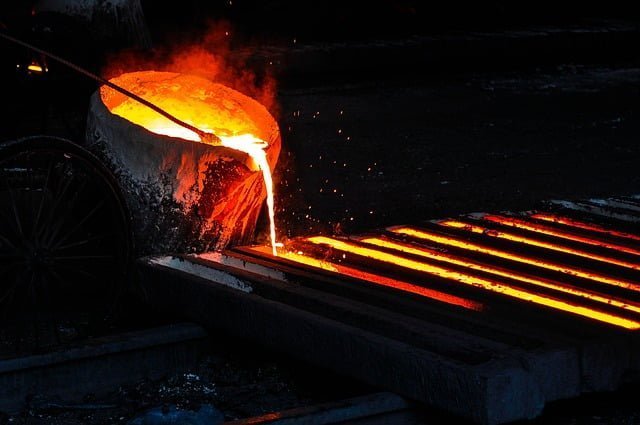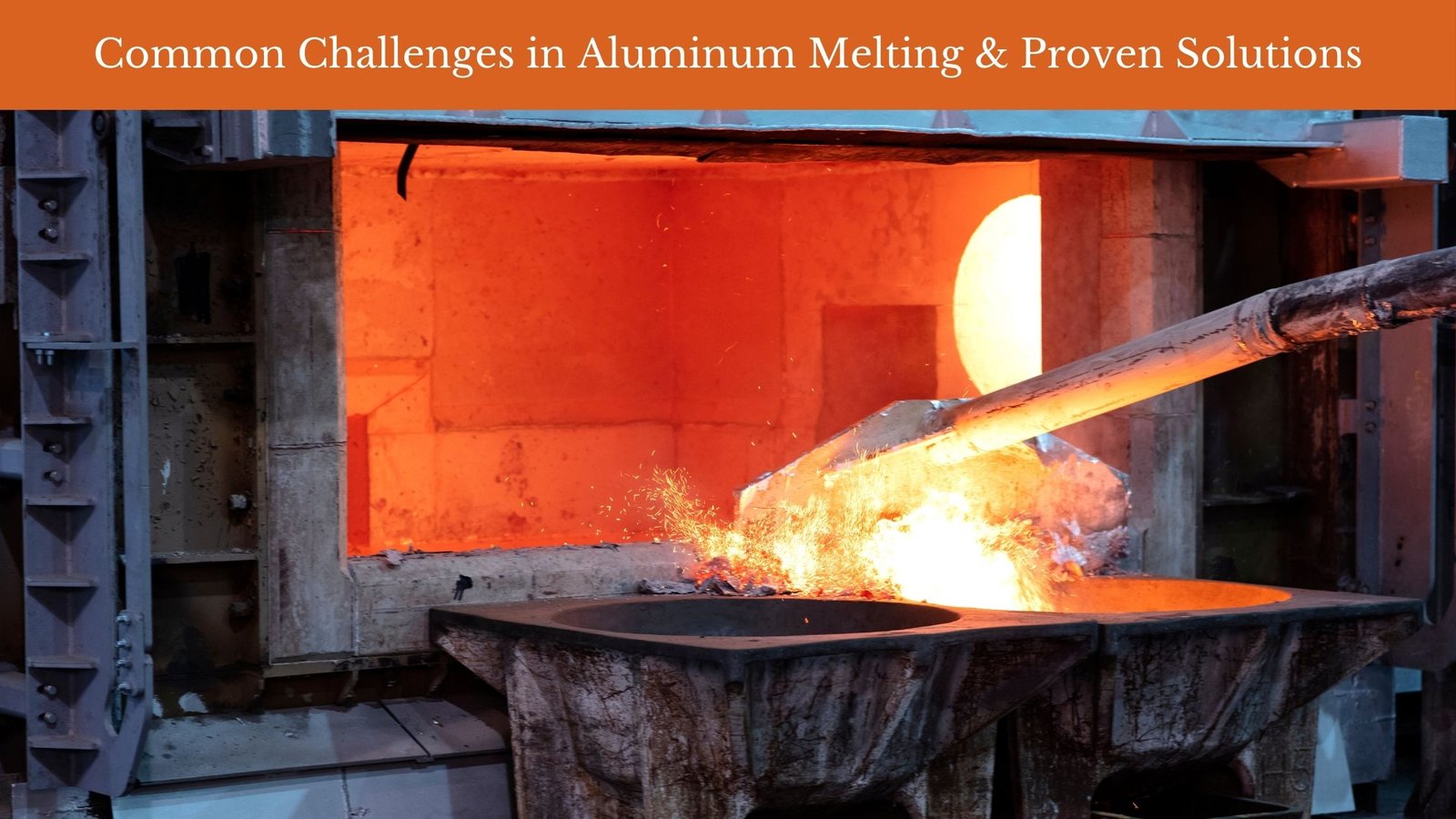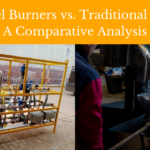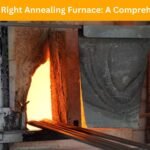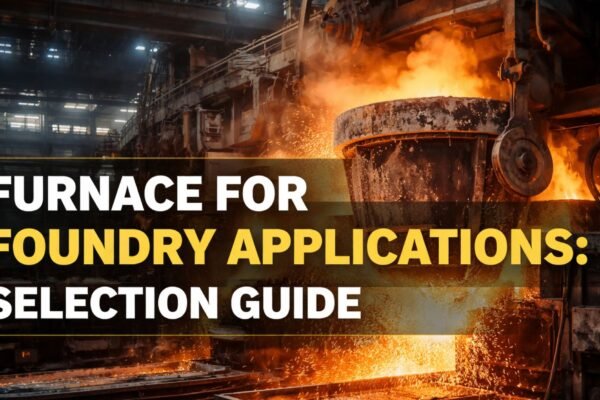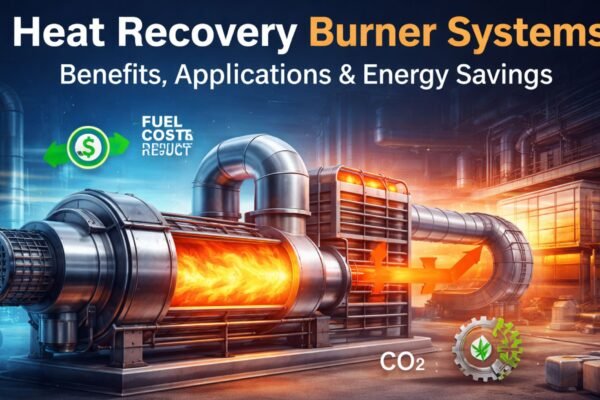Aluminum melting is a crucial process in industries such as automotive, aerospace, packaging, and construction, where molten aluminum is used for casting and fabrication. However, achieving efficient, high-quality aluminum melting is not always straightforward. Operators often encounter challenges that impact efficiency, metal quality, and overall productivity.
This blog will explore the common challenges in aluminum melting and provide proven solutions to ensure smooth operations, reduced energy consumption, and improved metal quality. Whether you are dealing with oxidation, metal contamination, or furnace inefficiencies, understanding these issues and their solutions is essential for achieving optimum performance.
Common Challenges in Aluminum Melting
1. Oxidation & Dross Formation
The Problem:
Oxidation occurs when molten aluminum comes into contact with oxygen, leading to the formation of aluminum oxide on the metal’s surface. This results in dross, a byproduct that reduces metal yield and increases material wastage.
Causes:
- High furnace temperature leads to rapid oxidation.
- Excessive exposure to air during melting and handling.
- Impurities in the scrap material used for melting.
How to Solve Aluminum Melting Problems Related to Oxidation:
- Use Fluxes: Applying specialized fluxes helps reduce dross formation by separating oxides from molten aluminum.
- Control Furnace Atmosphere: Using an inert gas cover (argon or nitrogen) minimizes oxygen exposure.
- Reduce Superheating: Keeping the melting temperature within optimal limits (660–750°C) prevents excessive oxidation.
- Efficient Scrap Cleaning: Ensuring scrap is clean and free from oil, dirt, or moisture before melting significantly reduces dross formation.
2. Metal Contamination & Impurities
The Problem:
Contaminants such as iron, silicon, magnesium, and other metals can alter aluminum’s properties, making it brittle or less conductive. Gas porosity and inclusions also lead to defects in the final castings.
Causes:
- Improper scrap selection leads to contamination.
- Residue buildup in melting furnaces.
- Hydrogen absorption from moisture in the furnace environment.
How to Solve Aluminum Melting Problems Related to Contamination:
- Use High-Purity Alloys: To maintain metal integrity, select raw materials with minimal impurity levels.
- Degassing Techniques: Employ argon gas purging or rotary degassing methods to remove hydrogen and unwanted gases.
- Filtration Systems: Use ceramic foam filters to trap solid impurities and improve casting quality.
- Regular Furnace Cleaning: Prevent slag buildup and residue contamination by scheduling frequent furnace maintenance.
3. Inefficient Energy Use & High Melting Costs
The Problem:
Aluminum melting is energy-intensive, and inefficient practices can lead to high fuel consumption, increased emissions, and elevated operating costs.
Causes:
- Heat loss from inefficient furnace insulation.
- Use of outdated or inefficient melting technologies.
- Overheating and long melting cycles.
How to Optimize Energy Efficiency in Aluminum Melting:
- Upgrade Furnace Technology: Switching to high-efficiency regenerative furnaces reduces energy consumption.
- Improve Insulation: Using ceramic fiber linings minimizes heat loss and maintains consistent furnace temperature.
- Optimize Charge Loading: Proper loading techniques prevent excessive heat loss and reduce melting time.
- Waste Heat Recovery: Installing heat exchangers recycles lost heat, cutting down on fuel costs.
For industries looking to optimize energy efficiency and reduce melting costs, investing in advanced aluminum melting furnaces is essential. Learn more about the latest energy-efficient aluminum melting furnace solutions from Encon Thermal Engineers
4. Inconsistent Metal Quality & Defects in Castings
The Problem:
Inconsistent aluminum quality results in rejected castings, production delays, and increased costs. Variations in metal composition, temperature fluctuations, and improper pouring techniques lead to defects.
Causes:
- Temperature instability during melting and pouring.
- Impurities and trapped gases in molten aluminum.
- Poor ladle and mold handling techniques.
How to Ensure High-Quality Aluminum Casting:
- Monitor Temperature Consistently: Use thermocouples and infrared sensors to maintain the correct melting and pouring temperatures.
- Preheat Molds & Ladles: Ensuring molds are at the right temperature prevents shrinkage defects and ensures uniform solidification.
- Use Grain Refiners & Modifiers: Additives like titanium boron help improve grain structure and casting integrity.
5. Melting Furnace Maintenance & Downtime Issues
The Problem:
Frequent furnace breakdowns and unplanned maintenance result in production downtime, high repair costs, and reduced output.
Causes:
- Buildup of aluminum oxide deposits in the furnace lining.
- Wear and tear of refractory materials.
- Improper burner operation leads to inefficient combustion.
How to Prevent Furnace Downtime & Improve Maintenance:
- Implement Scheduled Maintenance: Regular inspection of refractory linings, burners, and exhaust systems reduces breakdowns.
- Use Non-Wetting Refractory Coatings: These coatings prevent aluminum from sticking to furnace walls, reducing damage.
- Train Operators on Best Practices: Proper furnace handling increases efficiency and extends furnace life.
6. Environmental Concerns & Emissions Compliance
The Problem:
Strict environmental regulations require industries to limit emissions, reduce waste, and improve sustainability in aluminum melting.
Causes:
- High carbon emissions from fossil-fuel-based furnaces.
- Excessive dross generation contributes to material wastage.
- Poor ventilation leads to hazardous workplace conditions.
How to Reduce Environmental Impact in Aluminum Melting:
- Switch to Cleaner Fuel Sources: Natural gas, electric furnaces, or hybrid technologies lower emissions.
- Use Dross Recycling Techniques: Recovering aluminum from dross minimizes waste and maximizes yield.
- Install Advanced Air Filtration Systems: Helps in controlling particulate emissions and hazardous gases.
Conclusion
Aluminum melting is a complex process that comes with several technical and operational challenges. From oxidation and contamination to energy inefficiencies and environmental concerns, understanding these common issues in aluminum melting is key to optimizing performance.
By adopting proven solutions such as advanced furnace technology, process optimization, and regular maintenance, industries can enhance productivity, reduce costs, and improve metal quality.
For businesses looking to upgrade their aluminum melting process, partnering with Encon Thermal Engineers can provide innovative and energy-efficient solutions tailored to your needs.
